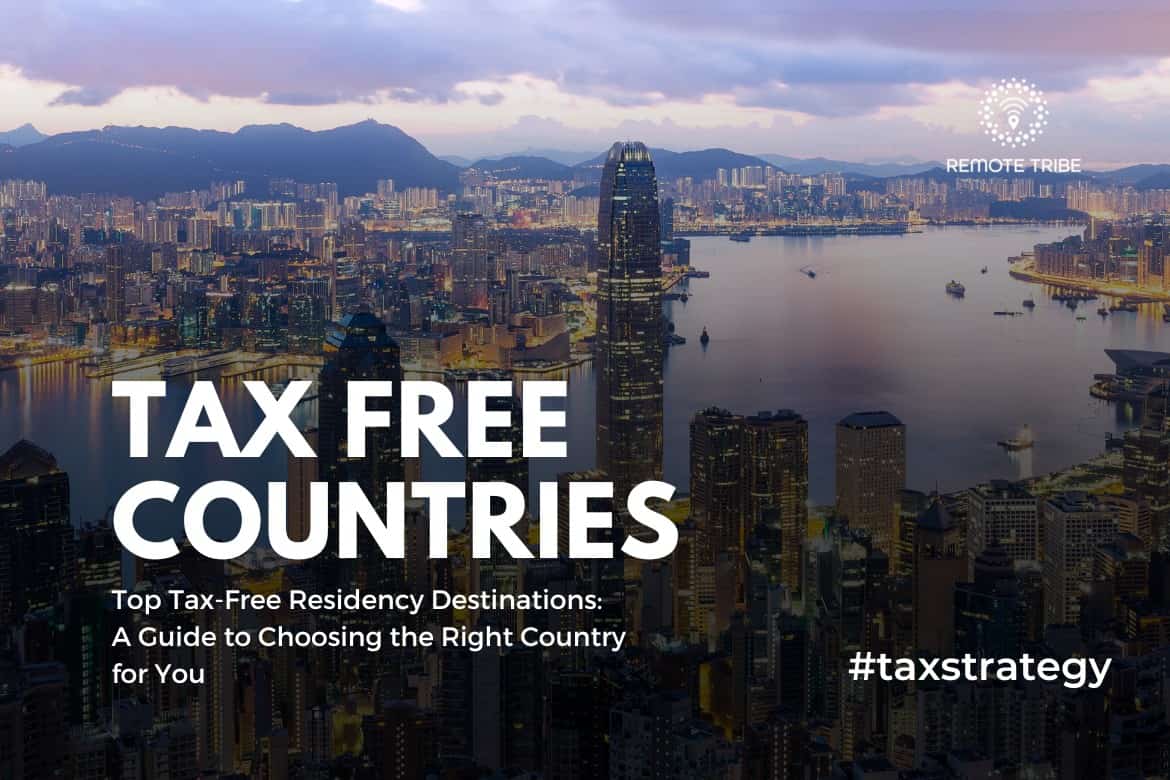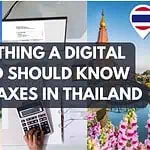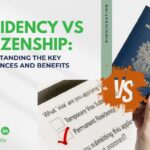Escape the Burden of Taxation: Your Guide to Tax-Free Countries
If you landed on this article, you probably already live in a high-tax-rate country. But this is not out of the ordinary. The majority of people find themselves in this situation and pay hefty amounts of tax every year. By not taking you are sending your own money down the drain and straight into the pockets of the taxman. But it doesn’t have to be like that.
You’ve been told you cannot register anywhere else or that business will disolve without having the (tax ) protection of a powerful government. Moreover, you hear on the news that the rest of the world is dangerous and that you’re safer at home and so on.
The reality though is different. You can choose your tax rate, have multiple residencies and passports which will offer you immense flexibility.
Depending on their setup and circumstance, some people will pay 0% tax whilst others will choose to pay a low percentage as a trade-off for other benefits as we’ll see in the article below.
For instance, you may not choose to pay 0% tax in Dubai and choose instead to pay taxes in a country like Italy or Portugal through the Italy Golden visa or Portugal golden visa, where your total tax bill will be substantially lower than what you pay now.
You’ll lower your taxes but not eliminate them, but you’ll be living in Portugal instead of Dubai.
This is an interesting trade-off that maybe you should consider.
There are plenty of jurisdictions offering either one of these options – zero or low tax. Keep reading, you’ll cover the most popular ones and the ones where we can help
Table of Contents
The importance of tax free countries - besides the obvious
Tax-free states provide a favourable tax environment that may be appealing to foreign investors, businesses, entrepreneurs, skilled workers, and consumers. This is due to the fact that tax-free countries allow people and firms to retain more of their revenues, which may boost economic growth, foster entrepreneurship, and attract competent personnel.
Moreover, tax-free countries can help to reduce tax evasion by creating a more favorable environment for tax compliance, resulting in increased tax revenue for the government.
In general, tax-free countries are important because they can have a positive impact on a country’s economy, making it more appealing to foreign investment and enterprises while also providing opportunities for entrepreneurs, skilled workers, and consumers.
Countries with no or low taxes, mainly use other types of indirect taxation so they can raise funds to pay for public services, most of these fees come from business, tourism, and real estate fees.
Many countries also offer tax incentives to newcomers as a sort of tax holiday or extremely low tax rates.
What Does "Tax-Free" Mean?
A tax-free country is one in which citizens and companies are exempt from paying certain sorts of taxes, such as income tax, corporate tax, or value-added tax (VAT).
Natural resources, tourism, financial services, and other industries provide revenue for governments in these countries.
Tax-free countries may also offer additional advantages, such as a cheap cost of living, a good quality of life, and a favorable business climate, which might attract individuals and businesses wishing to save money on taxes while also enjoying other benefits.
Income taxes for personal reasons are very limited, and most people route the taxes through companies to pay less. With tax evasion being outlawed, one can explore various legitimate ways to reduce their tax burden, such as taking advantage of tax deductions, investing in tax-advantaged accounts, or seeking advice from tax professionals.
Different types of taxes that may or may not be present in a tax-free country
Indirect taxation refers to a type of tax that is levied on goods and services rather than on individuals directly. It is usually collected by intermediaries in the supply chain, such as manufacturers or retailers, and passed on to the end consumer as part of the total price. Examples of indirect taxes include value-added tax (VAT), excise duties on alcohol , tobacco, and energy, customs and import duties, and sales taxes.
Indirect taxes have the advantage of being easy to collect and enforce, as they are usually collected at the point of production or sale. They also have the potential to raise significant revenue for governments. However, they may also be regressive as they disproportionately affect lower-income consumers, who may spend a greater percentage of their income on basic goods and services.
In contrast, direct taxes are those that are directly levied on individuals, such as income tax, property tax, and corporate tax. They are typically paid by the person who is subject to the tax, rather than being passed on to others.
Overall, the choice and balance between direct and indirect taxes depend on the government’s objectives, revenue needs, and distributional goals.
Watch the complete video where we explore the countries with lower taxes to start a business
Top Tax-Free Countries to Move To
Here is a list of countries that are often sought after by entrepreneurs, investors, and high-net-worth individuals who are looking to minimize their tax liability or become tax-free.
1. United Arab Emirates (UAE)

Qatar and Dubai are well known for their affluent and safe societies. A lot of global entrepreneurs (including crypto investors) have moved to Dubai lately due to the incentives these Gulf countries are now offering, including tax-free income.
Individual income tax is not imposed in the UAE. It does, however, levy corporate taxes on oil firms and international banks. An excise fee is charged on certain commodities that are often hazardous to human health or the environment. Most products and services are subject to VAT.
Although there is no tax on legal organizations in the country, firms with large net earnings must pay a 9 per cent federal corporate tax. This is one of the few crypto-tax-free countries in the world.
You can read more about the tax system in the UAE on their official website here.
Moreover, Qatar and Dubai have enacted investor-friendly rules and regulations, streamlined business registration requirements, and loosened ownership limitations. These steps have helped establish a business-friendly atmosphere that is beneficial to entrepreneurship and investment.
Another reason people are flocking there is that both Qatar and Dubai have made significant investments in infrastructure, tourism, and technology, making them appealing to both investors and company owners. The cities have world-class airports, elegant hotels, and cutting-edge technology, making them excellent sites for businesses to set up shop.
2. Bahrain
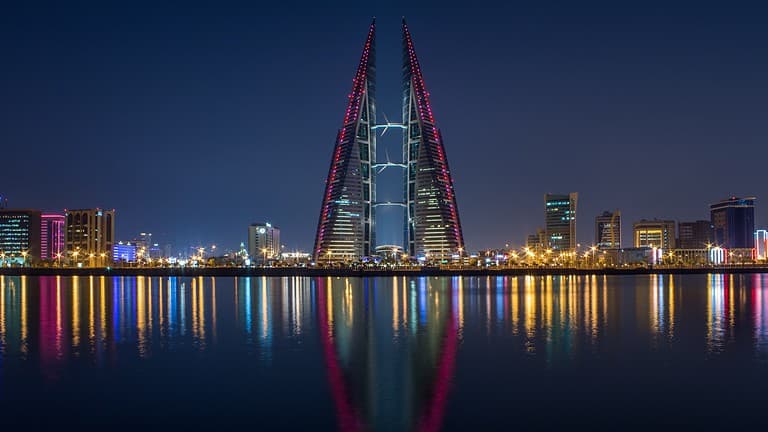
Bahrain is yet another tax free country in the Gulf when it comes to income tax. Personal income tax is also not collected in the Kingdom. Thus, all earnings, dividends, and other income are tax-free. The Kingdom has one of the lowest VAT rates in the world, at 5%, with a long range of exclusions and zero ratings.
Thus, all earnings, dividends, and other income are tax-free. The Kingdom has one of the lowest VAT rates in the world, at 5%, with a long range of exclusions and zero ratings.
The Kingdom of Bahrain has a low corporation tax (46%) that only applies to enterprises engaged in hydrocarbon exploration, production, or refining. The corporation tax rate for all other entities operating in the Kingdom is zero percent (0%).
Some people see Bahrain as a place where it’s difficult to live, and that’s because of the nation’s tropical climate, with scorching summers and cold winters. Expats account for over half of the population, and 70% of the country’s population is Muslim, which has different customs compared to the Western world.
You will not be granted citizenship, but you may seek permanent residency in the nation.
If you are an American retiree who invests $530,000 in the estate, you may be eligible for a residency visa under the Bahrain Golden Residency Visa programme. This visa is fantastic since it is renewable indefinitely as long as you continue to satisfy the conditions.
What Is A Tax Residency?
Tax residency refers to the determination of a person’s tax status in a particular country or jurisdiction. It is based on various factors such as the individual’s physical presence in the country, their citizenship or nationality, and their intention to stay or leave.
In the United States, for example, tax residency is determined by either the green card test or the substantial presence test. If an individual meets either of these tests, they are considered a resident for tax purposes and are subject to U.S. tax laws. Nonresidents, on the other hand, are only taxed on their U.S. source income.
In other countries, tax residency may be determined differently, often taking into account the individual’s physical presence in the country, their ties to the country, and their intention to stay there long-term. It’s important to understand the rules surrounding tax residency in each jurisdiction to ensure compliance with tax laws and avoid penalties
3. The Cayman Islands
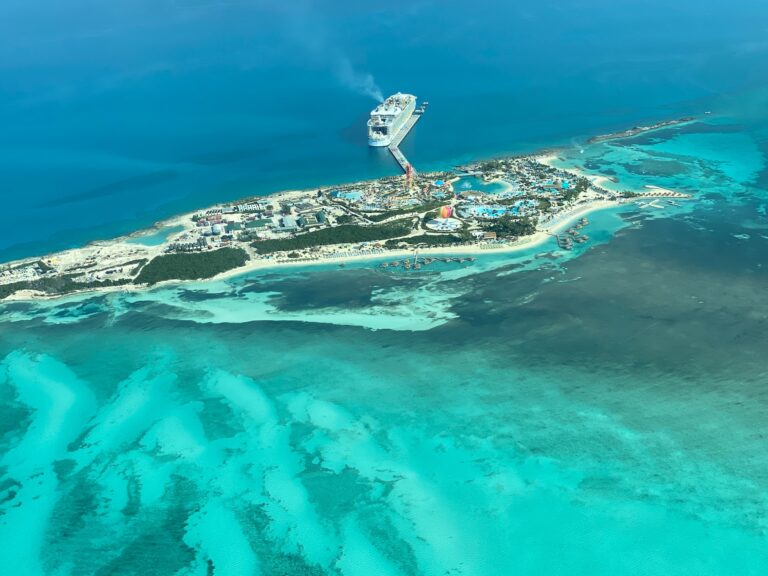
Residents of the Cayman Islands are not taxed. They have no income tax, no property tax, no capital gains tax, no payroll tax, and no withholding tax.
This tax rate is valid for foreigners or non-citizens in the Cayman Islands and is 0% for its citizens as well.
The Cayman Islands are considered a tax haven since they do not levy a corporate tax, making it an excellent location for multinational firms to locate subsidiary organizations to shelter part or all of their profits from taxation.
So Cayman Island is another tax-free country where you might want to register your company or residency.
When it comes to citizenship, you cannot apply for it, but you can obtain residency by investing $2.4 million.
4. The Bahamas
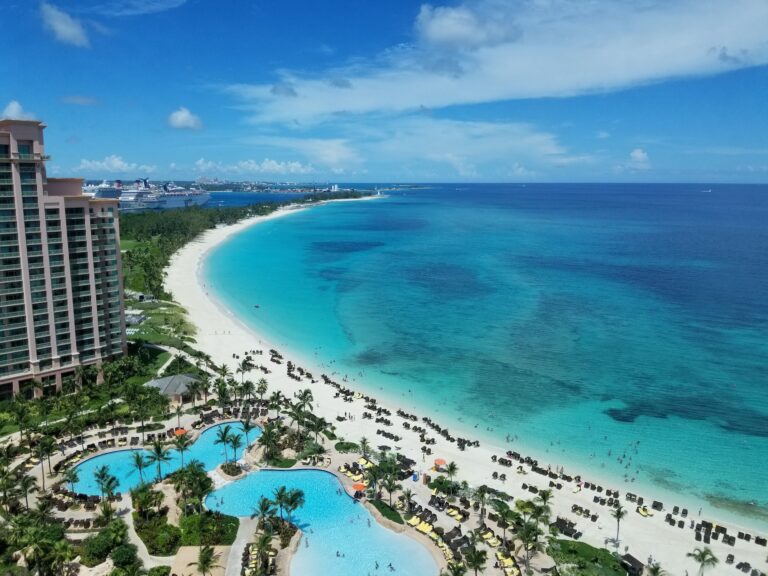
The Bahamas does not levy an income tax on citizens or non-residents, so US ex-pats residing in the Bahamas simply need to file their US tax returns and do not need to file a Bahamas tax return. The Bahamas’ tax-free status makes it an appealing location for American ex-pats wishing to cut their tax payments.
Nonetheless, American expats in the Bahamas must still deal with US tax regulations, such as reporting their global income to the IRS and submitting needed documents such as the Foreign Bank Account Report (FBAR) and Foreign Account Tax Compliance Act (FATCA). Noncompliance with US tax regulations can lead to fines, interest, and possibly legal action.
How to become a resident of the Bahamas: Various options are available. The first option is to apply for a homeowner’s card, which is offered to property owners with a value of $500,000 or more. You can stay in the country for up to a year with this card.
Another option is to apply for permanent residency after spending at least five years in the Bahamas. To do so, you must pass a medical checkup, have financial resources, and be of good character.
Alternatively, you can petition for citizenship through investment by putting down at least $750,000 in the Bahamas’ economy. This method allows you to get citizenship without having to live in the country for an extended period of time.
Allow us to develop a comprehensive offshore plan tailored to your needs
Our team of experts can assist you in legally minimizing your offshore tax rate, safeguarding your assets, exploring overseas investment opportunities, and obtaining a secondary citizenship. We have already assisted hundreds of individuals in accomplishing these goals.
5. Panama

Panama is well-known as a tax haven for foreign investors, whether they are individuals trying to extend their property holdings or corporations looking to expand. This is due, in part, to their well-developed financial infrastructure and stable political climate. It provides a diverse range of investment options, making it an appealing location for a wide spectrum of investors.
Panama is a pure tax haven due to its legal and tax frameworks. It does not levy income, corporation, capital gains, or estate taxes on offshore organisations that solely conduct business outside of the country. Offshore corporations can conduct business locally, which is a unique benefit, but they must pay local taxes as a result.
For enterprises and individuals, the country’s tax policies are among the most favorable in the world. The corporate tax rate in the country is only 10%, and there are no taxes on income or capital gains.
The country’s financial infrastructure is sophisticated and comprises several banks and financial organizations. This gives overseas investors access to the money they need to expand their operations. Additionally, its political environment is stable and conducive to business, which aids in attracting investment.
When it comes to the legal system of the nation, it is built on common law principles, making it easier for foreign investors to comprehend and manage.
Another interesting thing about this country is that it has tight banking confidentiality rules in place to safeguard account holders’ privacy. Panama also does not have any tax treaties with foreign countries and no exchange control regulations.
These are just a few reasons why Panama is an attractive site for international investors seeking to reduce their tax obligations.
6. Dominica

The island is classified as a tax haven for both investors and corporations.
Individual taxes in Dominica are based on the taxpayer’s status. They might be either tax residents or non-residents.
Non-residents must pay taxes in Dominica if they get income from sources within the nation, such as renting out their property.
Tax residents in Dominica, on the other hand, pay income tax on any income earned in the nation and abroad. To be considered a tax resident, a person must live in the country for at least 183 days each year.
However, investors must pay taxes in Dominica if they get money there, establish a company, purchase real estate, or become tax residents. The major tax is income tax, which can reach up to 35% for individuals and 25% for businesses. Legal entities must additionally pay VAT at a rate ranging from 10% to 15%. Dominica’s taxes are exceptionally cheap in comparison to other countries’ tax structures.
Dominica’s tax system is commonly regarded as one of the primary benefits of Dominican citizenship, which is granted to qualified foreigners under the country’s Citizenship by Investment (CBI) program. Participants in the Dominica citizenship by investment program are not obliged to reside in the nation prior to or following the acquisition of a passport. Also, keep in mind that an investor does not instantly become a Dominica tax resident after getting a passport.
If you eventually decide to settle in Dominica as an economic citizen, you will pay a low personal income tax rate and no capital gains tax.
7. Saint Lucia

Residents of Saint Lucia who earn less than EC$18,400 (6,800 USD) per year are exempt from paying income tax. The country has a progressive tax system: higher taxes for wealthier individuals.
For example, anyone making more than $18,000 USD per year will be paying a 30% tax on everything over that amount.
Individuals pay the following taxes in Saint Lucia: income tax, social contributions, royalties, and interest tax. Nevertheless, there are no inheritance or capital gains taxes in the nation.
In St. Lucia, income tax is payable on the following items:
- labor activity
- business income
- royalty and interest (taxed at 10%)
- rent
A resident seller pays a maximum of 5% stamp duty when selling real estate, whereas a non-resident seller pays twice as much, or- 10%.
A foreigner becomes a tax resident if he stays more than 183 days in the nation in a calendar year. This is permanent or temporary residency permission as well as St Lucian citizenship.
When it comes to the business, they are exempt from paying VAT if their annual sales do not exceed EC$400,000 ($150,000 USD). They pay 10% tax on interest and royalties rather than 15% to 25%.
Saint Lucia citizenship is very advantageous, and people can apply for it (more on this below). It helps with tax optimization and allows visa-free travel to 147 countries worldwide, including the United Kingdom, Schengen nations, Singapore, and Hong Kong.
Participating in the investment program is the quickest way to get citizenship. An applicant contributes to the economy by making a nonrefundable payment to a government fund, purchasing bonds or real estate, or investing in a business.
In the case of a non-refundable payment, the investor contributes at least $100,000 to the Saint Lucia National Economic Fund.
Another way to obtain citizenship is to invest $300,000 USD in government bonds. After 5-7 years, the bonds can be sold and the money refunded. In addition to the bonds, the investor must pay a $50,000 administrative charge.
Citizenship through real estate
The program requires a minimum investment of $200,000 when purchasing real estate. The property can be sold and the investment repaid after 5 years. Moreover, the investor must pay a state charge of at least $30,000.
Business investments begin at $1,000,000. A foreigner spends money on government-approved initiatives. The investment is $3,500,000 if the investor joins the
8. Bermuda
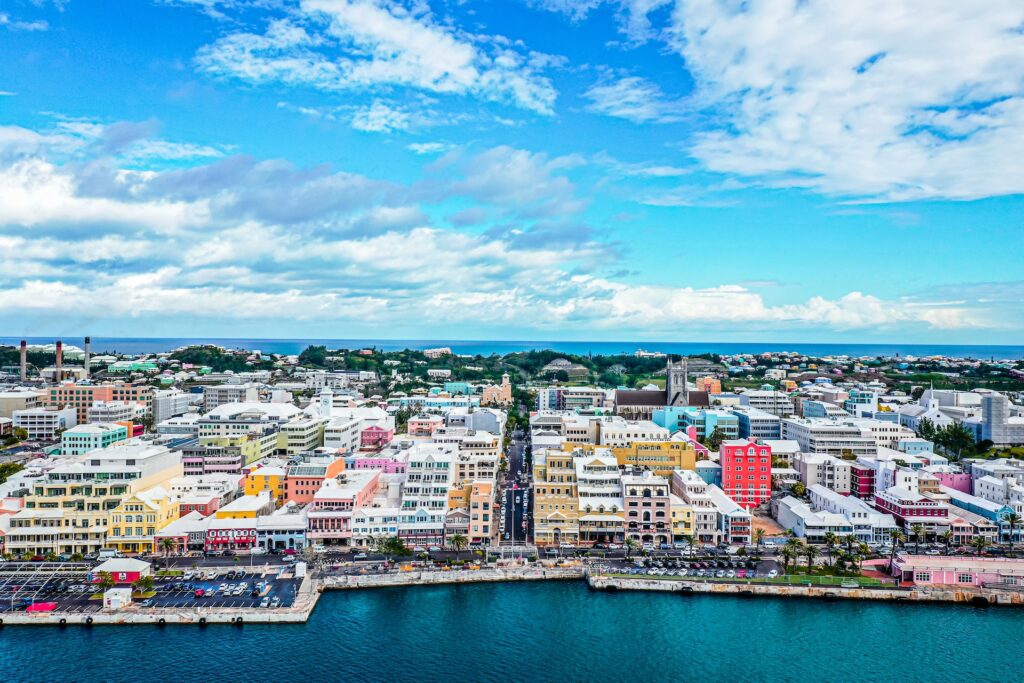
Bermuda is a British Overseas Territory located in the North Atlantic Ocean. As a territory of the United Kingdom, Bermuda has its own government, constitution, and laws.
Bermuda is well-known for its advantageous tax environment (as in tax-free) when it comes to tax residency. There is no personal income tax, capital gains tax, or inheritance tax in the country. As a result, it is an appealing destination for individuals and organizations looking to reduce their tax bills.
It is worth mentioning, however, that in order to qualify as a Bermuda tax resident, an individual must be present on the island for at least 183 days in a calendar year.
However, the tax residence does not depend just on the number of days spent in Bermuda, so the taxation in Bermuda is not really that straightforward. Other factors include whether a person has a permanent home in Bermuda, their work position, and their general relationship with the country. For example, if a person spends fewer than 183 days in Bermuda but has a permanent abode and/or substantial links to the community, they may be deemed a tax resident.
Even though Bermuda does not have a capital gains or inheritance tax, Bermuda tax residents may still be subject to these taxes in their home countries, depending on their specific circumstances and the tax legislation of their home countries.
Overall, identifying tax-free residences in Bermuda may be a complicated procedure, and people should seek the advice of a tax expert who is familiar with tax laws and regulations.
Other Factors to Consider When Choosing a Tax-Free Country
Cost of Living
In general, the cost of living in tax-free countries can be higher than in countries with higher tax rates, as these countries often offer better infrastructure, higher salaries, and a more luxurious lifestyle. However, the cost of living in tax-free countries can vary depending on factors such as location, lifestyle, and personal preferences.
For example, the cost of living in cities such as Dubai or Abu Dhabi can be quite high due to the luxury lifestyle that is prevalent in these areas. Housing, transportation, and food can be expensive, especially if you choose to live in upscale neighbourhoods or frequent high-end restaurants and clubs. Another example is Monaco, which is known for its luxury shopping, high-end restaurants, and yacht culture, which can be expensive.
So keep all these things in mind if you’re considering moving to such a place because it might affect your budget.
Quality of life
Generally, the quality of life in tax-free countries varies according to a variety of factors, such as the country’s economy, culture, and infrastructure.
Some tax-free nations, such as the United Arab Emirates, Qatar, and Bahrain, offer excellent living standards, modern infrastructure, world-class healthcare, and a diverse range of cultural and recreational alternatives. On the other hand, tax-free countries, such as the Cayman Islands, Monaco, and Vanuatu, have a more relaxed pace of life with a focus on tourism and outdoor activities. These countries may not have the same level of infrastructure or access to high-quality healthcare as some other tax-free countries.
Ultimately, the standard of living in tax-free countries is determined by your personal goals and choices. Some people enjoy a high wage and access to luxury products and services, but others choose a simpler lifestyle that includes access to natural beauty and outdoor activities.
Employment opportunities
Some of the tax-free countries do have strong private sectors where there are employment opportunities. Some popular tax-free countries for employment opportunities include the United Arab Emirates (UAE) which is very popular amongst expats seeking tax-free employment opportunities. The country offers a thriving job market and high salaries in sectors such as finance, healthcare, and construction.
Qatar is another Middle Eastern country that offers tax-free employment opportunities. The country’s economy is largely driven by the oil and gas industry, but there are also job opportunities in sectors such as hospitality and construction.
Monaco’s economy is largely driven by the tourism and banking industries, and there are opportunities for employment in these sectors.
In the Cayman Islands you might find jobs in the financial services industry, in areas such as banking, insurance, and fund management.
Healthcare and education systems
Some tax-free nations have universal healthcare systems in which the government provides free or subsidised healthcare to all inhabitants, whilst others have a mixed system in which public and private healthcare providers coexist.
The United Arab Emirates (UAE), for example, is a tax-free country with a diversified healthcare system. The government offers free healthcare to citizens and subsidised healthcare to ex-pats, and there are also private healthcare providers.
However, just because a country is tax-free does not imply that its healthcare system is faultless or without flaws. Issues such as the quality of healthcare practitioners, the accessibility of healthcare services, and the availability of medical resources can all have an impact on a healthcare system’s efficacy. So you want to look closely into it before becoming a resident or moving there.
When it comes to education, it’s hard to fully evaluate it in tax-free countries since numerous factors can influence its quality, including available resources, curriculum, teaching techniques, and teacher credentials and experience.
The quality of education can vary widely within a given country, and there may be significant disparities in educational outcomes between different regions or socio-economic groups.
Language and culture
Cultural and linguistic adaptation to another nation may be a complicated and difficult process that necessitates acclimating to a new environment and way of life.
It might be especially difficult if you are not proficient in the local language or are unfamiliar with the new country’s culture and traditions.
The language barrier is one of the major obstacles. Cultural differences might make it difficult to integrate into the local community. Diverse habits, beliefs, and societal standards may clash with your own, requiring you to modify your conduct and mentality.
Furthermore, adapting to the new environment, including the climate, cuisine, geography, and transportation networks, might be difficult.
Legal and administrative obstacles might sometimes be a problem too.
No-tax Countries Versus Low-tax Countries
A “no-tax country” is a country that does not levy taxes on its residents or enterprises. Income taxes, capital gains taxes, corporation taxes, and other forms of taxes are not levied in these nations. These type of governments are uncommon, with the majority consisting of tiny islands or territory with limited inhabitants, resources, and infrastructure. Some examples of tax-free countries are like the ones we discussed about, like Monaco, the Cayman Islands, and Vanuatu.
On the other hand, a “low tax country” is one that has a lower tax rate than other countries but nevertheless collects some amount of taxes from its residents and enterprises. These nations usually have a more developed economy and provide a higher standard of living, infrastructure, and public services than tax-free jurisdictions.
As a general trend, no-tax countries are appealing to wealthy individuals and corporations seeking to avoid paying taxes in their home countries, whereas low-tax countries are popular with businesses and investors seeking a favourable tax environment while still benefiting from the benefits of a stable economy and society.
Frequently Asked Questions About Tax Free Countries
Most frequent questions and answers about tax free countries
Which country is completely tax-free?
One of the primary reasons Dubai is called a tax-free city is that the UAE has a federal tax system that does not levy either personal income tax or company tax on residents.
Instead of depending on income and corporate taxes, the UAE earns money from alternative ways such as oil exports, tourism, real estate, and foreign investment. Furthermore, the Dubai government has developed a variety of policies and efforts to attract international investors and enterprises to the city, such as tax breaks and other incentives for firms operating in specific industries.
Why does UAE have no tax?
There are several reasons why the UAE has no income tax or corporate tax.
Well-known for its one-of-a-kind tax structure, the UAE does not charge income or corporation taxes. This system is the consequence of a number of elements that make the country an appealing place for firms and individuals to invest and operate.
The cash provided by oil exports is one of the key reasons why the UAE has no income or company tax. The UAE government gets considerable cash from oil exports as a major oil-producing country, allowing it to offer public services and infrastructure without relying on income or corporation taxes.
Apart from oil money, the UAE has enacted business-friendly laws to foster economic growth and attract international investment. These policies include 100% foreign ownership of companies, no restrictions on the repatriation of profits, and minimal bureaucracy.
Is Saudi a tax free country?
Saudi Arabia is often regarded as a tax-free country. Saudi Arabia has no personal income tax, corporation tax, or value-added tax (VAT).
Nevertheless, certain taxes and fees are levied on specific commodities and services, such as customs charges, excise taxes on specific items, and fees for particular government services. There may also be taxes levied by local municipalities or other regional bodies. Nonetheless, in comparison to many other nations throughout the world, Saudi Arabia is seen as having a low tax burden.
Is Dubai a tax free country?
Yes, Dubai is a tax-free country. The United Arab Emirates, which includes Dubai, has no personal income or capital gains tax.
Furthermore, most products and services in Dubai are VAT-free, while a 5% VAT was implemented in 2018 on some goods and services such as food and beverage, entertainment, and transportation.
Is Switzerland tax free?
Switzerland is not a tax-free country. They offer special programs for UHNWI who would like to keep their money on the SW banking system with privacy and protection. Please get in touch if you are an ultra-high-net-worth individual and need consulting on the Swiss Banking System.
Do I have to move abroad to optimise my tax?
The tax regulations governing worldwide tax residency may differ based on your place of residence, the length of your stay abroad, and other variables. In general, if you are a tax resident of a country, you may have to pay taxes on income made anywhere in the globe. In contrast, if you are not a tax resident of a certain nation, you may only be obligated to pay taxes on income generated within that country.
For particular tax-related concerns, we strongly advise to speak with a trained tax practitioner or refer to your country’s tax legislation. You may also find resources like the International Taxation Network or the Organization for Economic Cooperation and Development (OECD) beneficial for learning more about tax residence and other relevant issues.

